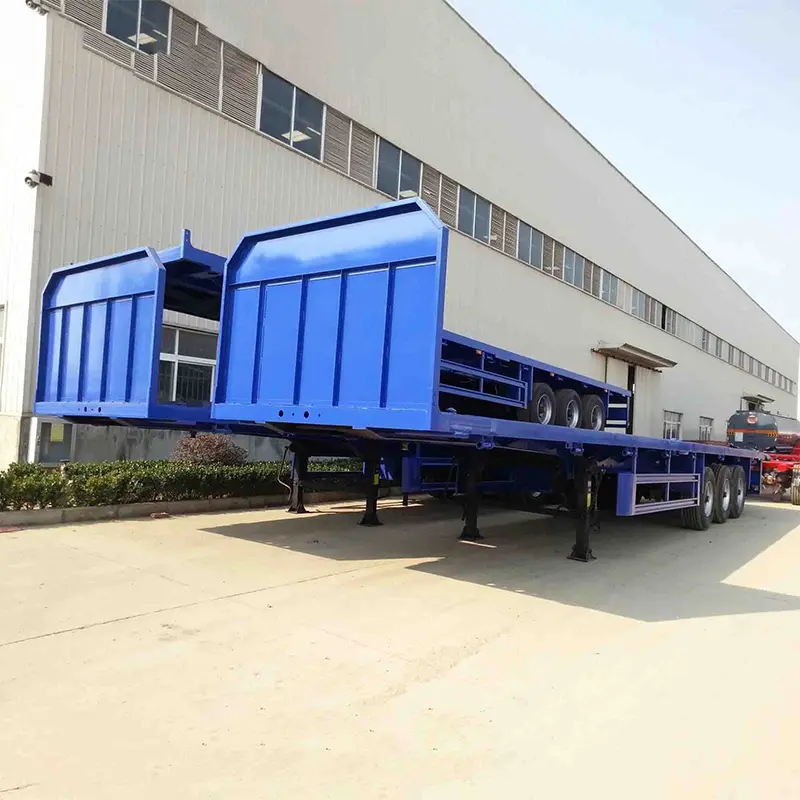 English
English Español
Español  Português
Português  русский
русский  Français
Français  日本語
日本語  Deutsch
Deutsch  tiếng Việt
tiếng Việt  Italiano
Italiano  Nederlands
Nederlands  ภาษาไทย
ภาษาไทย  Polski
Polski  한국어
한국어  Svenska
Svenska  magyar
magyar  Malay
Malay  বাংলা ভাষার
বাংলা ভাষার  Dansk
Dansk  Suomi
Suomi  हिन्दी
हिन्दी  Pilipino
Pilipino  Türkçe
Türkçe  Gaeilge
Gaeilge  العربية
العربية  Indonesia
Indonesia  Norsk
Norsk  تمل
تمل  český
český  ελληνικά
ελληνικά  український
український  Javanese
Javanese  فارسی
فارسی  தமிழ்
தமிழ்  తెలుగు
తెలుగు  नेपाली
नेपाली  Burmese
Burmese  български
български  ລາວ
ລາວ  Latine
Latine  Қазақша
Қазақша  Euskal
Euskal  Azərbaycan
Azərbaycan  Slovenský jazyk
Slovenský jazyk  Македонски
Македонски  Lietuvos
Lietuvos  Eesti Keel
Eesti Keel  Română
Română  Slovenski
Slovenski  मराठी
मराठी  Srpski језик
Srpski језик
What Makes a Flatbed Trailer the Choice for Modern Transportation?
2025-09-28
In the world of logistics and heavy-duty transportation, the flatbed trailer has emerged as one of the most versatile solutions. A flatbed trailer is a specialized type of open-deck trailer that provides a flat loading surface without sides or a roof. Unlike enclosed trailers, this design allows the transport of oversized, irregularly shaped, or heavy cargo that cannot fit within the restrictions of a standard container. Industries ranging from construction to agriculture, manufacturing, and infrastructure development rely heavily on flatbed trailers because of their adaptability.
The global demand for flatbed trailers continues to rise as businesses search for reliable, cost-efficient, and multipurpose solutions for freight movement. Whether you are moving steel pipes, prefabricated building materials, machinery, or even large vehicles, a flatbed trailer ensures that the cargo can be safely and securely transported without limitations in height or width.
So why does this matter? In today’s fast-moving supply chain, efficiency and flexibility are paramount. A flatbed trailer reduces handling time, accommodates a wide range of cargo, and improves operational productivity. This versatility makes it indispensable for logistics companies and independent operators alike.
How Do Flatbed Trailers Work in Real-World Logistics?
Understanding how a flatbed trailer operates is essential for evaluating its role in transportation. Essentially, flatbed trailers are designed to provide maximum accessibility to cargo from all sides. Forklifts, cranes, or loaders can approach the trailer without the restrictions of walls or ceilings. This dramatically reduces the time needed for loading and unloading while also allowing more freedom in positioning large or irregular cargo.
Key Features That Define a Flatbed Trailer:
-
Open Platform Design: No enclosed structure, allowing oversized cargo to be loaded easily.
-
Durable Frame: Constructed using high-strength steel to withstand heavy loads and harsh conditions.
-
Cargo Security Options: Multiple tie-down points, winches, and chains ensure secure fastening.
-
Axle Configurations: Available in 2-axle, 3-axle, or extendable axle designs for balancing load distribution.
-
Load Flexibility: Supports a variety of cargo, from timber and coils to heavy equipment and containers.
Flatbed trailers also come in specialized variations, such as extendable flatbeds for longer cargo, step-deck trailers for taller loads, and lowboys for extremely heavy machinery. These options give companies a wide range of choices depending on their transport requirements.
Why Should Businesses Invest in Flatbed Trailers?
The question many fleet managers and business owners ask is: why should I choose a flatbed trailer over other types of trailers? The answer lies in its adaptability, efficiency, and cost-effectiveness.
Advantages of Flatbed Trailers:
-
Versatility: Able to transport oversized, awkwardly shaped, or extra-wide cargo.
-
Time Efficiency: Faster loading and unloading compared to enclosed trailers.
-
Cost Savings: Reduces the need for special permits in many cases because of better cargo adaptability.
-
Durability: Built for long-term use in demanding environments.
-
Operational Flexibility: Useful across multiple industries—construction, manufacturing, logistics, and agriculture.
To illustrate these benefits more concretely, let’s look at detailed specifications of modern flatbed trailers.
Flatbed Trailer Product Parameters
| Parameter | Specification Range |
|---|---|
| Length | 12m – 16m (customizable) |
| Width | 2.5m – 3m |
| Height | 1.5m – 1.6m deck height |
| Axles | 2 – 4 axles (options available) |
| Suspension | Mechanical / Air suspension |
| Material | High-tensile steel |
| Payload Capacity | 30 – 80 tons (depending on design) |
| Tire Options | 8.25R20, 11.00R20, or custom |
| Braking System | Dual-line pneumatic braking |
| Kingpin Size | 50mm or 90mm |
| Landing Gear | 28T or heavy-duty support legs |
These specifications provide both standard and customizable options, ensuring that businesses can select trailers designed to fit their operational needs. Whether you require lightweight transport solutions or heavy-duty haulers, flatbed trailers can be engineered to match.
How Can Flatbed Trailers Improve Your Logistics Future?
The future of transportation depends on efficiency, safety, and sustainability. Flatbed trailers contribute to these goals by minimizing downtime, maximizing cargo adaptability, and supporting multi-industry applications.
Practical Applications Across Industries:
-
Construction: Moving steel beams, prefabricated walls, pipes, and concrete components.
-
Agriculture: Transporting tractors, harvesters, hay bales, and large equipment.
-
Logistics: Hauling containers, palletized goods, and bulk freight.
-
Energy Sector: Moving wind turbine parts, generators, and drilling equipment.
-
Manufacturing: Delivering heavy machinery or factory modules.
Safety Considerations
Transporting oversized cargo always comes with risks. Flatbed trailers are designed with safety in mind. Reinforced tie-down points, proper load distribution, and industry-compliant braking systems ensure that even the heaviest loads remain stable. Operators are trained to use chains, straps, and tarps effectively, further reducing risks on the road.
Environmental Considerations
Modern flatbed trailers are increasingly being designed with fuel efficiency in mind. Lighter yet stronger materials help reduce overall vehicle weight, minimizing fuel consumption and lowering carbon emissions. For companies committed to sustainability, this is a crucial factor when choosing transportation equipment.
Common Questions About Flatbed Trailers
Q1: What type of cargo is best suited for a flatbed trailer?
A flatbed trailer is ideal for oversized, irregularly shaped, or heavy cargo that does not fit into an enclosed container. Examples include steel pipes, heavy machinery, construction materials, and agricultural equipment. Its open design allows for side and top loading, making it flexible for different cargo types.
Q2: How do you secure cargo on a flatbed trailer?
Cargo is secured using chains, straps, binders, and tarps. Flatbed trailers come with multiple tie-down points to ensure that items are tightly fastened during transportation. For large or heavy cargo, cranes or forklifts are used for precise loading, followed by careful securing to meet transportation safety standards.
Why Choose Shandong Derun Vehicle for Your Flatbed Trailer Needs?
Choosing the right flatbed trailer is not just about transportation—it is about reliability, efficiency, and long-term value. Flatbed trailers stand out as one of the most versatile solutions for industries that require adaptability and strength in logistics. They allow businesses to save time, cut costs, and ensure cargo security across diverse applications.
Shandong Derun Vehicle has established itself as a trusted manufacturer of high-quality trailers designed to meet global standards. With a commitment to durability, safety, and customization, Shandong Derun Vehicle provides flatbed trailers that deliver consistent performance in real-world conditions.
If you are looking to upgrade your logistics capabilities with durable and reliable flatbed trailers, contact us today to learn more about our range of solutions and how we can support your transportation needs.





